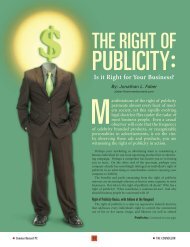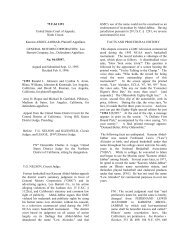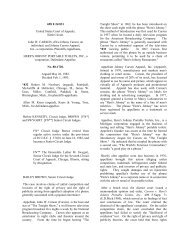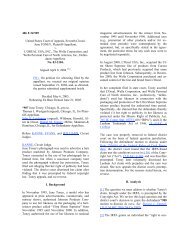Rufo v. OJ Simpson - Right Of Publicity
Rufo v. OJ Simpson - Right Of Publicity
Rufo v. OJ Simpson - Right Of Publicity
Create successful ePaper yourself
Turn your PDF publications into a flip-book with our unique Google optimized e-Paper software.
Page 9<br />
<strong>Simpson</strong> contends "a period of time had transpired between the event<br />
and the<br />
statements," and Nicole "had an opportunity to 'contrive and<br />
misrepresent' and to regain her 'reflective powers.'" The record<br />
supports the trial court's contrary conclusion. Whether the<br />
requirements of the spontaneous statement exception are satisfied in<br />
any given case is largely a question of fact. The determination of this<br />
question is vested in the trial court. The trial court necessarily<br />
exercises discretion in deciding it. The discretion of the [*591]<br />
trial court is at its broadest when it determines whether the nervous<br />
excitement still dominated and the reflective powers were still in<br />
abeyance. (People v. Poggi, supra, 45 Cal. 3d at pp. 318-319; People v.<br />
Farmer (1989) 47 Cal. 3d 888, 904, 254 Cal. Rptr. 508, 765 P.2d 940.)<br />
The trial court here did not abuse its discretion in concluding<br />
Nicole's statements to the officers satisfied the spontaneous statement<br />
exception. (People v. Poggi, supra, 45 Cal. 3d at pp. 319-320; People<br />
v. Hughey, supra, 194 Cal. App. 3d 1383, 1388; People v. Forgason<br />
(1979) 99 Cal. App. 3d 356, 365, 160 Cal. Rptr. 263.)<br />
State of Mind Evidence<br />
Hearsay is a statement made other than while testifying as a<br />
witness, which statement is offered in the trial to prove the truth of<br />
the matter asserted in the statement. (Evid. Code, @ 1200, subd. (a),<br />
fn. 3, ante.) Unlike the two statements to officers concerning prior<br />
incidents which were admitted to prove the truth of the matters<br />
asserted, the statements made in the telephone call to the battered<br />
women's shelter, the diary entries, and the letter were expressly<br />
limited to the purpose of showing Nicole's state of mind. Most of the<br />
statements were not hearsay at all, because they were not admitted to<br />
prove the truth of the matters asserted.<br />
Thus, under plaintiffs' offers of evidence and the trial court's<br />
rulings and instructions limiting the purpose of the evidence, the<br />
statements made in the telephone call to the battered women's shelter<br />
were not admitted to prove: (a) that her ex-husband had been calling<br />
her, begging her to come back to him; (b) that he was stalking her; (c)<br />
that she found him staring at her in a restaurant and a market and<br />
following her vehicle; (d) that he had beaten her throughout the<br />
marriage; and (e) that he had told her different times that if he ever<br />
caught her with another man he would kill her. The statements in the<br />
diary were not admitted to prove that Nicole evaded taxes. The<br />
statements in the letter were not admitted to prove: (a) that <strong>Simpson</strong><br />
beat Nicole and they lied to the x-ray lab that she fell off her bike;<br />
(b) that the "mad New Years Eve beat up" occurred; and (c) that <strong>Simpson</strong><br />
committed "infidelity, wife beating, verbal abuse."<br />
Rather, these statements were offered or admitted only as<br />
circumstantial evidence from which inferences could be drawn concerning<br />
how Nicole felt about the nature of the relationship between her and<br />
<strong>Simpson</strong>. They were offered to explain her conduct in finally<br />
terminating the relationship, which in turn was alleged to have<br />
provoked <strong>Simpson</strong> to murder. As such, they were not hearsay. (People v.<br />
Ortiz (1995) 38 Cal. App. 4th 377, 389-390; 1 Witkin, Cal. Evidence<br />
(4th ed. 2000) Hearsay, @@ 37-39, 198, pp. 719-721, 915.)







